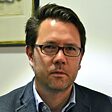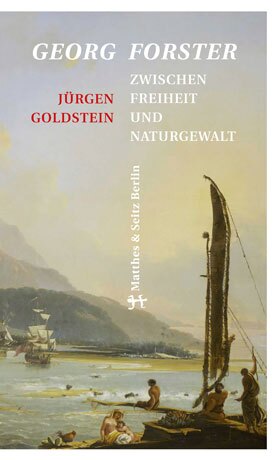Jürgen Goldstein
Georg Forster. Zwischen Freiheit und Naturgewalt.
[Georg Forster. Between Freedom and Forces of Nature.]
- Matthes & Seitz Verlag
- Berlin 2015
- ISBN 978-3-95757-090-1
- 302 Pages
- Publisher’s contact details
Jürgen Goldstein
Georg Forster. Zwischen Freiheit und Naturgewalt.
[Georg Forster. Between Freedom and Forces of Nature.]
Sample translations
Meridians of a Life of Adventure – Georg Forster: Circumnavigator, Scientist, Revolutionary
In a short but restless life, Georg Forster (1754-1794) – naturalist, translator, explorer and revolutionary – combined two worlds which to this day are usually kept firmly separated: politics and nature. You can see the logic behind Jürgen Goldstein choosing “Freedom and forces of nature” as the subtitle for his 2015 biography of Forster. While previous studies of the man tended to focus on one aspect over the other, or simply lost their way confronted with such a superabundance of incident, for Goldstein they remain inseparable: “Combining the concepts of freedom and forces of nature allows one to keep in hand the Ariadne’s thread that leads through the labyrinth of Forster’s inconstant life: from teenage naturalist to political revolutionary.” Goldstein, a philosophy professor at Koblenz Landau University who specializes in early modern subjectivity and rationality, has picked up this thread before, in his 2013 book Die Entdeckung der Natur: Etappen einer Erfahrungsgeschichte (The Discovery of Nature: Stages in the history of new horizons). There the 19-year-old Georg Forster, who took part in Cook’s second circumnavigation in 1773 and reached Tahiti with him, had a chapter dedicated to him and ranked among the travelling writers and writing explorers who, Goldstein proposed, had permanently altered the way we view nature.
In his new book, Goldstein places Forster’s life and achievements more firmly in the context of their times: born in 1754 in a small village near Gdansk, from a young age Forster accompanied his father on voyages down the Volga, before joining Cook on his voyage of exploration while still a teenager. The young man with the inquiring mind grew up in an epoch in which mystery still lay beyond unexplored horizons and the traditional understanding of the world was being pushed aside by new discoveries. ‘Measuring the World’ had only just begun, and for Forster this went hand in hand with unmediated experience of nature and natural phenomena, which were to be seen with one’s own eyes, to be felt and sensed for oneself.
The immediacy of these experiences (touching an iceberg, tasting exotic fruit) is transmitted by the vivacity of Forster’s writing, which in Goldstein’s eyes makes him one of the greats of travel writing, the godfather of later and in the main more famous explorers. He claims Alexander von Humboldt learned how to describe nature from Forster, and Darwin in turn from von Humboldt. Yet Goldstein sees Forster as neither a theoretician nor a philosopher, but as an essayist, who permitted himself to, in his own words, “philosophize in an unphilosophical manner” and who also claimed the human right to be “illogical and unpredictable.”
Goldstein repeatedly places this unread classic of German intellectual history center stage using quotes and extracts that allow the “profile of his experiences and reflections” their head. The result is a rich panorama of his life and times, a bildungsbiographie if you will, which illuminates the connections between experience and action, between the immediacy of events and the abstraction of thought, between nature and politics. Goldstein takes Forster’s entire corpus into account “his most significant works as well as the many, in part obscure, essays, his reviews and speeches, his diaries and finally his letters, more than a thousand of them,” in order to “cartographize his thinking and delineate the meridians of his life.”
There’s certainly no lack of incident and adventure in an imposing curriculum vitae: the early move to England with his father; a three year voyage on board Cook’s Resolution, which took them closer to the south pole than any had been before; the return to Germany and friendships with Buffon and Benjamin Franklin, Alexander von Humboldt and Georg Christoph Lichtenstein (Forster dubbed him a “sorcerer of prose”); the dispute with Kant about racial categories; the participation in revolutionary upheaval in Mainz and its recapture by Prussian troops while Forster was in Paris as vice-president of the national convention, negotiating Mainz’ union with revolutionary France.
Using passages dedicated to historical events in particular, but also Forster’s writing on nature, Goldstein is able to demonstrate what he understood by “natural politics,” why he declared “natural revolutions” to be breakthroughs in free self-determination, comparing them to inundations and volcanic eruptions. He recognized the changing of the seasons in the course of world history and held the influence of climate on human societies to be decisive. Forster considered a knowledge of nature to be critical not just to ensure basic human survival, but also for the “edification of heart and soul” – the moral being rooted in the physical, after all. “For Forster, nature was neither ideal nor profane; rather, it was an overwhelming force that could be immediately experienced.” The mesmeric power of this experience can still be felt today, and Jürgen Goldstein has done a formidable job conveying it in this book.
By Matthias Weichelt
Matthias Weichelt is Editor-in-Chief of the journal Sinn und Form. He writes for a number of publications including the "Frankfurter Allgemeine Zeitung" and the "Neue Zürcher Zeitung".
Publisher's Summary
Georg Forster (1754–1794) was one of the most fascinating figure of his century: a brilliant writer, natural scientist, explorer, painter, translator and a revolutionary. He touched icebergs with his own hands during his circumnavigation around the globe with James Cook, strolled around Tahiti‘s beach, visited indigenous people, lived among “cannibals” and crossed oceans and the equator. Even more: he was a central part of the political events of his time when, inspired by the French Revolution, he proclaimed the “Republic of Mainz” in 1793, the first republic on German ground. No one before (and after) him has dedicated himself to such an experiment, to hot-wire nature and politics in such a matter. The sparks that were created by his general principles illuminated the world for an instant and raised hope for the possibility of something like “natural revolutions”.
(Text: Matthes & Seitz Verlag)
